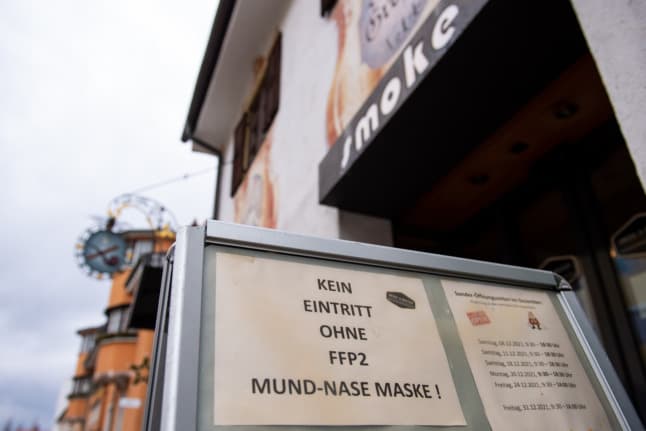Germany 'undermining confidence' in pandemic measures with bad communication

Germany's Council of Experts has claimed that the government risks alienating and confusing the public with its poor communication around Covid.
In a statement released on Sunday, the Council of Covid Experts, which includes the Robert Koch Institute's Lothar Wieler and high-profile virologist Christian Drosten, gave a damning assessment of the government's crisis communication so far in the pandemic.
"Most citizens want to actively contribute to ending the pandemic and behave according to applicable and reasonable rules," they wrote. However, "a lack of consistency of available information, its assessments and the resulting recommendations contributes to uncertainty among the population".
"This provides a target for misinformation and disinformation, undermines confidence in government action and jeopardises the success of important measures to protect health."
In what is so far the fifth position paper released by the panel, the experts urged the government to step up its game and implement "responsive, evidence-based, target-group and user-specific risk and health communication" as a matter of urgency.
Their strategy involved four key stages: the first was gathering of the best available knowledge; the second was translating the data into easily understandable, target-group specific information; the third was disseminating this data via "modern communication channels" and the fourth was showing willingness to review and adapt the strategy, if necessary.
READ ALSO: ANALYSIS: Are Germany’s Covid rule changes backed up by science?
The news comes just weeks after the Ministry of Health made important changes to both the 'vaccinated' and 'recovered' by quietly updating the guidance on the Paul Ehrlich Institute website.
People who'd had a Covid infection suddenly found that the amount of time they could rely on their 'recovered' status in bars, restaurants and other venues had been halved from six months to three, while people vaccinated with Johnson & Johnson found they suddenly needed an extra jab to count as fully vaccinated.
Speaking to The Local after the changes, a number of readers complained about the lack of reliable information and "confusing" communication from the government.
“It’s very confusing trying to figure out the current rules,” one reader said, while others said the communication from the government was "infuriating".
READ ALSO: ‘Hard to keep up’: Your verdict on Germany’s ever-changing Covid rules
In a final barb at parliamentarians and officials, the expert council claimed there wasn't a single institution or authority in Germany who had followed best practices so far in its communications.
Its four crisis communication steps should now be implemented "quickly" to win back public trust, it argued.
Comments (5)
See Also
In a statement released on Sunday, the Council of Covid Experts, which includes the Robert Koch Institute's Lothar Wieler and high-profile virologist Christian Drosten, gave a damning assessment of the government's crisis communication so far in the pandemic.
"Most citizens want to actively contribute to ending the pandemic and behave according to applicable and reasonable rules," they wrote. However, "a lack of consistency of available information, its assessments and the resulting recommendations contributes to uncertainty among the population".
"This provides a target for misinformation and disinformation, undermines confidence in government action and jeopardises the success of important measures to protect health."
In what is so far the fifth position paper released by the panel, the experts urged the government to step up its game and implement "responsive, evidence-based, target-group and user-specific risk and health communication" as a matter of urgency.
Their strategy involved four key stages: the first was gathering of the best available knowledge; the second was translating the data into easily understandable, target-group specific information; the third was disseminating this data via "modern communication channels" and the fourth was showing willingness to review and adapt the strategy, if necessary.
READ ALSO: ANALYSIS: Are Germany’s Covid rule changes backed up by science?
The news comes just weeks after the Ministry of Health made important changes to both the 'vaccinated' and 'recovered' by quietly updating the guidance on the Paul Ehrlich Institute website.
People who'd had a Covid infection suddenly found that the amount of time they could rely on their 'recovered' status in bars, restaurants and other venues had been halved from six months to three, while people vaccinated with Johnson & Johnson found they suddenly needed an extra jab to count as fully vaccinated.
Speaking to The Local after the changes, a number of readers complained about the lack of reliable information and "confusing" communication from the government.
“It’s very confusing trying to figure out the current rules,” one reader said, while others said the communication from the government was "infuriating".
READ ALSO: ‘Hard to keep up’: Your verdict on Germany’s ever-changing Covid rules
In a final barb at parliamentarians and officials, the expert council claimed there wasn't a single institution or authority in Germany who had followed best practices so far in its communications.
Its four crisis communication steps should now be implemented "quickly" to win back public trust, it argued.
Join the conversation in our comments section below. Share your own views and experience and if you have a question or suggestion for our journalists then email us at [email protected].
Please keep comments civil, constructive and on topic – and make sure to read our terms of use before getting involved.
Please log in here to leave a comment.